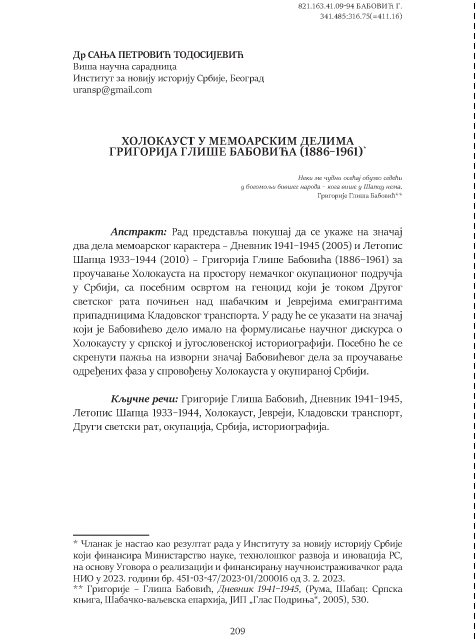Приказ основних података о документу
Holokaust u memoarskim delima Grigorija Gliše Babovića (1886-1961)
The Holocaust in the memoirs of Grigorije Gliša Babović (1886-1961)
| dc.contributor | Stanković, Marijana | |
| dc.contributor | Bezugolјni, Aleksej Jurjevič | |
| dc.creator | Petrović Todosijević, Sanja | |
| dc.date.accessioned | 2024-02-14T13:03:48Z | |
| dc.date.available | 2024-02-14T13:03:48Z | |
| dc.date.issued | 2023 | |
| dc.identifier.isbn | 978-86-80947-91-4 | |
| dc.identifier.uri | https://www.jevrejskadigitalnabiblioteka.rs/handle/123456789/2665 | |
| dc.description.abstract | Rad predstavlјa pokušaj da se ukaže na značaj dva dela memoarskog karaktera - "Dnevnik 1941-1945" (2005) i "Letopis Šapca 1933-1944" (2010) - Grigorija Gliše Babovića (1886-1961) za proučavanje Holokausta na prostoru nemačkog okupacionog područja u Srbiji, sa posebnim osvrtom na genocid koji je tokom Drugog svetskog rata počinjen nad šabačkim i Jevrejima emigrantima pripadnicima Kladovskog transporta. U radu će se ukazati na značaj koji je Babovićevo delo imalo na formulisanje naučnog diskursa o Holokaustu u srpskoj i jugoslovenskoj istoriografiji. Posebno će se skrenuti pažnja na izvorni značaj Babovićevog dela za proučavanje određenih faza u sprovođenju Holokausta u okupiranoj Srbiji. | sr |
| dc.description.abstract | Most memories of the Holocaust, or the crimes committed against the Jewish people who lived or found themselves on the territories that became part of the German occupation zone in Serbia in April 1941, were ‘recorded’ in the years after the end of World War II. Except for the well-known four letters of Belgrade Jew Hilda Dajč, written from December 7th, 1941 to early February 1942 in the Jewish concentration camp in Zemun, there are no other published writings by Holocaust victims or survivors in the German occupation zone in Serbia during World War II. Due to the lack of ‘first-hand’ historical sources, special attention should be given to the rare testimonies of contemporaries from the German occupation zone in Serbia dating from World War II. These include two manuscripts by the Serbian Orthodox Church priest (and post-war children’s writer) Grigorije Gliša Babović: "Diary 1941-1945" (2005) and the "Šabac Chronicle 1933-1944" (2010). Babović’s legacy had an exceptional impact and significance in shaping the historiographical narrative of the Holocaust carried out during World War II over Šabac Jews and emigrants from the Kladovo Transport. Babović’s memoir recognizes all phases of the Holocaust implementation in the territory of the German occupation zone in Serbia: the registration, census, confiscation of property, marking, forced labor, dismissal from jobs, and internment in concentration camps, which was followed by mass executions. Babović was a deeply contemplative and ethical observer, not only of the chronology of the events but also of all the actors of the Holocaust. | sr |
| dc.language.iso | sr | sr |
| dc.publisher | Kragujevac : Spomen-park "Kragujevački oktobar" | sr |
| dc.rights | openAccess | sr |
| dc.rights.uri | https://creativecommons.org/licenses/by-nc-nd/4.0/ | |
| dc.source | Civilne žrtve Drugog svetskog rata (1939-1945) | sr |
| dc.subject | Grigorije Gliša Babović - Dnevnik 1941-1945 | sr |
| dc.subject | Letopis Šapca 1933-1944 | sr |
| dc.subject | Holokaust | sr |
| dc.subject | Jevreji | sr |
| dc.subject | Kladovski transport | sr |
| dc.subject | Drugi svetski rat | sr |
| dc.subject | okupacija | sr |
| dc.subject | istoriografija | sr |
| dc.subject | Holocaust - memories | sr |
| dc.subject | Kladovo transport | sr |
| dc.subject | occupation | sr |
| dc.subject | Second World War | sr |
| dc.subject | historiography | sr |
| dc.title | Holokaust u memoarskim delima Grigorija Gliše Babovića (1886-1961) | sr |
| dc.title | The Holocaust in the memoirs of Grigorije Gliša Babović (1886-1961) | sr |
| dc.type | bookPart | sr |
| dc.rights.license | BY-NC-ND | sr |
| dc.rights.holder | © Spomen-park "Kragujevački oktobar" | sr |
| dc.identifier.fulltext | http://jevrejskadigitalnabiblioteka.rs/bitstream/id/8522/HolokaustUMemoarskimDelimaOCR.pdf | |
| dc.type.version | publishedVersion | sr |
| dc.citation.spage | 209 | |
| dc.citation.epage | 246 | |
| dc.identifier.cobiss | 132573193 | |
| dc.identifier.cobiss | 132573193 | |
| dc.identifier.rcub | https://hdl.handle.net/21.15107/rcub_jdb_2665 |

